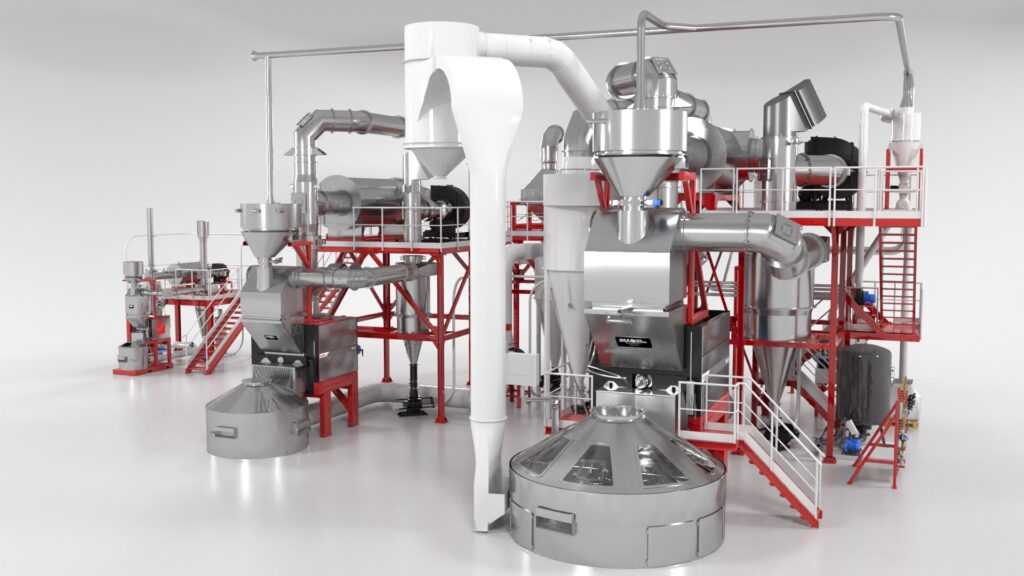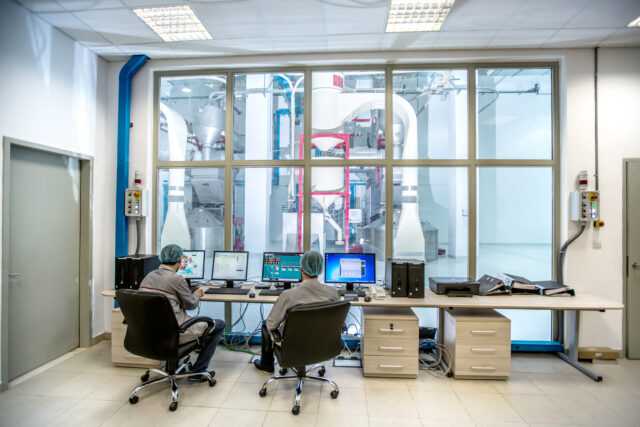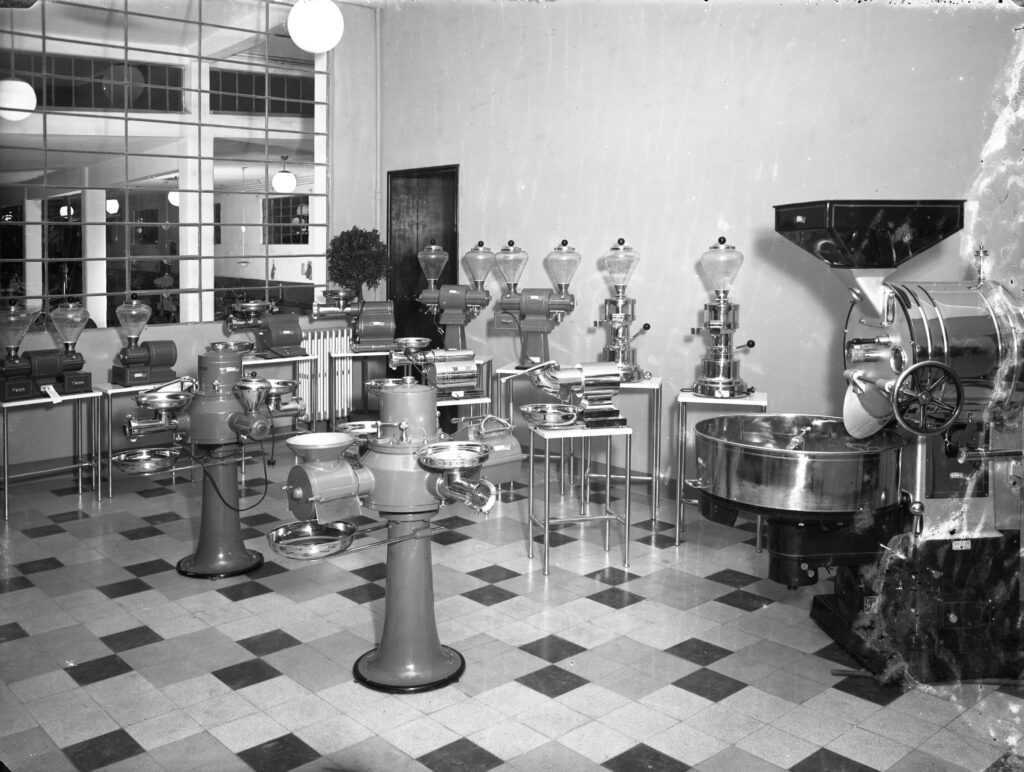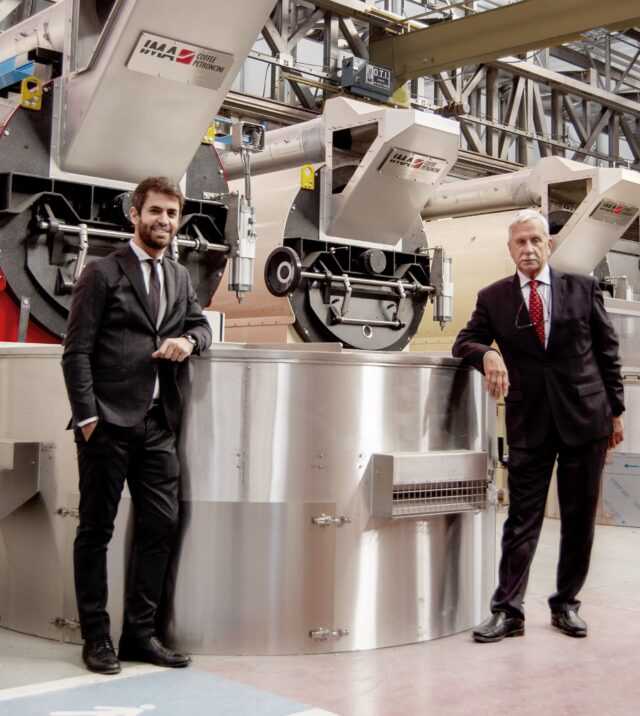MILAN – With over 100 years’ experience in the market, you could hardly say Petroncini is new to coffee processing. Its history is worthy of the best “Made in Italy” tradition. Since the early 1900s, Petroncini has become famous all over the world for the quality of its roasters: sturdy materials and the forged cast iron typical of Italian manufacturing has become Petroncini’s passport worldwide. Today supported by the research and development, sales, and service organisations of Ima Group, this marks an important turning point in Ima Coffee Petroncini’s long history.
Nicola Panzani has recently been appointed as the new CEO of Petroncini, guiding the company towards new important goals, the product of important synergies.
During the recent official presentation, Claudio Giberti, CEO at Petroncini since 1990, talks about this moment as an important milestone for the company.
“I’m really glad to pass on this leading role to a very talented person, whom I deeply trust. He will guide the company towards newer, broader horizons”, he said. “Roasters all over the world will be expecting great new solutions from the Petroncini portfolio. I will continue my mission in the world of coffee, and I will be fully dedicated to new special R&D projects for Petroncini to consolidate our vision for innovation” he continues.
What are the reasons behind the soundness of Petroncini?

“Commitment and continuous research have worked as essential tools that have enabled Petroncini to reach very important milestone over the past year: 100 years creating solutions for the coffee industry” Giberti says.
“There is an important truth which makes me particularly proud of this milestone, making it possible to maintain our brand awareness: the innovation applied to Petroncini machines over the years has in no way affected the sturdiness of the materials and the reliability of the original product” he continues. “On the contrary, over the years, Petroncini R&D efforts have allowed us to find solutions capable of achieving the highest level of technology, efficiency, productivity and safety, combined with maximum attention to coffee integrity, for any requirement, plant capacity or processing line, from A to Z. It’s only thanks to these that I can proudly affirm that Petroncini’s 100 years’ experience represents the solid base and starting point for many others under the name of IMA Coffee Hub” Giberti says.
How has the market changed and what are the characteristics and innovations applied to Petroncini roasters nowadays in response to market trends?

“The new Petroncini machine concept faithfully reflects the essentials of the company’s long-standing traditions” Nicola Panzani, CEO at IMA Coffee Petroncini explains “but now technology is the core value behind Petroncini new-generation roasters and complete plant equipment, from green coffee reception systems right down to complete packaging lines.”
“Nowadays, the key factors of coffee business success are mainly product quality and consistency, personalisation of the aroma combined with highest possible productivity of the roasting plant, energy efficiency and protection of the environment “ Panzani continues. “The very stimulating challenge of recent years has been the fine tuning of a roasting control system able to guarantee the reliability, consistency and repeatability of the end product over time.”
Petroncini designed TMR for the first time in 1995, Panzani continues, and since then its R&D efforts to outperform this technology have never ceased.
“The benefits of these machines are considerable, and we can affirm – thanks to our customers – that TMR owns the most reliable roasting control present on the market” Panzani states.
What are the benefits of TMR Roasters?
“Less CO2, less maintenance, and better cleanliness inside the machine are just some of the advantages of TMR machines. They boast substantial energy saving benefits, with an average of 30/35% compared to traditional roasters, the most advanced safety and monitoring system on the market” Panzani explains.
What do you expect from the future?
“Since the establishment of the IMA Coffee Hub in 2017, the company has been growing exponentially. Thanks to the support of IMA, which has studied, examined and grasped the keys to the company’s success, Petroncini now has all the resources to embark on new pathways in the projects in which it excels and to explore new markets and new technologies to keep on evolving. I’m so proud to be part of this big and innovative company.” Panzani declares.
There seem to be some new projects on the horizon…
“Absolutely yes. Petroncini headquarters in Ferrara, already equipped for the R&D and pilot plant, will soon include a new LAB entirely dedicated to coffee tech and analysis, covering a total area of 2,000 sqm.”
With over 1 million-euro investment, IMA Coffee Petroncini is strengthening its Coffee R&D LAB, which will be the new starting point for many new products dedicated to the coffee industry.
Within the Coffee R&D LAB, a new pilot plant will soon be installed, complete with the best coffee processing technologies and solutions, from the reception of green coffee to roasting, from grinding to packaging machines, both for capsule and vertical bag packaging. Here, customers will be able to test the most advanced process technologies, supported by highly qualified coffee processing trainers and consultants.
“Some projects are already up and running in the new Coffee R&D LAB. One of these is closely related to roasting control systems and is called “Ai-learning to roast“, a new control model that uses Machine Learning intelligence. One of the main advantages that this project is related to the automation of the roasting process, in order to ensure product consistency regardless of external factors such as changing environmental conditions and organoleptic characteristics of the product. In this way, the system becomes autonomous and less dependent on the skills of the operators” Panzani reveals.
An R&D team specifically dedicated to the design of new prototypes for roasting and processing technologies has been strengthened, explains Panzani. The research team will work in synergy with the IMA Digital division to develop new important projects related to Industry 4.0. IoT technologies, Remote FAT and Virtual Commissioning, plus Cloud connectivity are just some of the key points of this ongoing revolution, with the aim of drastically improving machine quality and client company productivity.
















